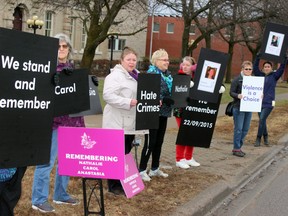Borutski awaits decision on parole eligibility while facing life sentence

Article content
The Crown summed up its sentencing submissions Tuesday for triple-murderer Basil Borutski with lead prosecutor Jeffery Richardson saying, “I’m not sure there’s much difference between (age) 97 and 128.”
In the Crown’s submission, Borutski, serving consecutive automatic life sentences for first-degree murder convictions in the deaths of Anastasia Kuzyk and Nathalie Warmerdam, would be 128 years old by the time he could apply for parole in the death of Carol Culleton, for whose death he was found guilty of second-degree murder.
The minimum sentence for first-degree murder is life with no parole for at least 25 years; for second-degree murder it's life with no parole for 10 years.
Calling for life imprisonment with no chance of parole for 70 years, Richardson said during Borutski's sentencing hearing in Pembroke that Borutski was beyond rehabilitation, calling him “a clear danger to society for the rest of life … He is a threat that will never diminish until he himself dies.”
Court-appointed amicus James Foord argued that such a sentence would be “unduly long and harsh” and offered instead a period of 15 years parole ineligibility, to be served consecutively following concurrent life sentences for the first-degree murder convictions — meaning Borutski would first become eligible for parole at age 97.
Both sentencing scenarios take into account the amount of time Borutski has been in custody since his arrest on Sept. 22, 2015, hours after the three killings.
Both Crown and amicus suggested that under either scenario, it was likely Borutski would spend the rest of his life in jail.
Borutski remained silent throughout the hearing, which was moved back to its original setting at Renfrew County courthouse after the jury trial was held in Ottawa. Borutski spoke only once in the closing days of his trial, without the jury present, accusing the judge of lying and maintained, “I’m not guilty.”
Borutski made no such statement Tuesday and said nothing when afforded his final opportunity to address the court by Justice Robert Maranger.
Richardson said Borutski “has not taken responsibility in the course of this trial and he probably never will.”
While Borutski remained impassive, emotions spilled over in court as victim impact statements were read as prepared by friends and family members of the three murdered women.
Crown prosecutor Julie Scott read a statement from Kristy Schultz, girlfriend of Nathalie Warmerdam’s son Adrian. Adrian Warmerdam had testified during the trial as a witness to his mother’s murder, describing the day Borutski arrived with a shotgun and chased her screaming through the house.
“Adrian and I still live our lives in fear. No matter where we go we’re always on edge. It’s now been over two years and we still live in fear … You don’t get a break, this follows you everywhere you go … ”
Warmerdam’s mother, Maz Tracey described in her victim impact statement the “anger, grief, despair, horror, sadness and guilt experienced by my family due to the senseless, avoidable and horrific murder.”
Her father, Frank Hopkins, called Borutski “an accomplished con artist (who would) dupe women that came into his life, including, it would seem, his parole officer.”
His victim impact statement levelled criticism at a system that allowed Borutski, a man “who has shown utter contempt for parole conditions,” to avoid his court-ordered domestic violence counselling, and procure a firearm.
Demonstrators held signs outside the courthouse with the names of the victims, urging people to “Remember Sept. 22, 2015.”
Representatives of the Renfrew County chapter of End Violence Against Women (EVA) read into the record a victim impact statement on behalf of the community, which drew parallels to the Dec. 6, 1989, massacre of 14 women at L’Ecole Polytechnique in Montreal.
Borutski will learn his sentence on Wednesday, the 28th anniversary of the tragedy.
“We want our community to be safe, but it doesn’t feel safe any more for many of us. We struggle as a community to know whether safety from men’s violence against women is really possible,” said Jennifer Valiquette, EVA co-chair.
JoAnne Brooks, EVA co-chair and director of the Women’s Sexual Assault Centre, said Renfrew County women are 30 per cent more likely to be threatened with a gun. The rural communities, Brooks said, “face well-known, unique day-to-day vulnerabilities such as personal isolation due to vast geography, no public transportation, women’s economic realities, potentially long crisis response times, lack of privacy and confidentiality, concerns about where to hide, where to be safe and a lack of community resources due to funding by population.”
Brooks said the names of Carol Culleton, Anastasia Kuzyk and Nathalie Warmerdam are now engraved among the 23 victims of male partner violence on the Renfrew County Women’s Monument in Petawawa.
The group will welcome supporters at a Dec. 6 vigil Wednesday morning at the Women’s Monument on the Emerald Necklace Trail in Petawawa beginning at 9 a.m. and at a second vigil in Eganville this evening.
Bernadette McCann House is hosting a candlelight vigil Wednesday evening beginning at 6 p.m. in the hall at Wesley United Church in Pembroke.
Justice Maranger was expected to render his sentencing decision this morning.
ahelmer@postmedia.com
Twitter.com/helmera